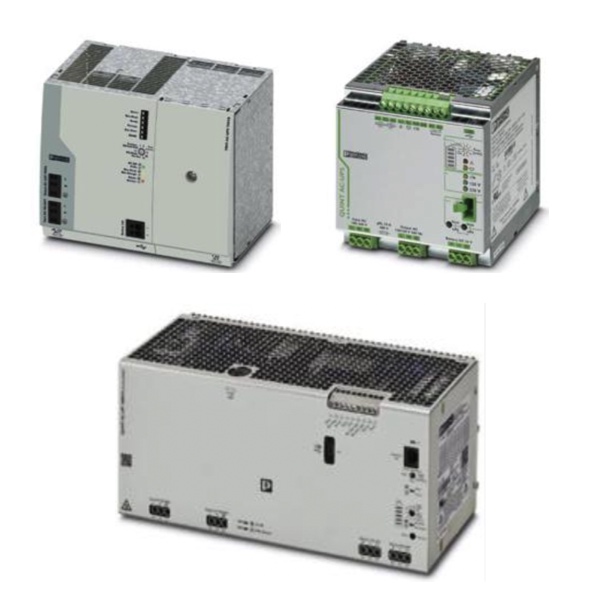Phoenix Contact AC UPS

RSP Supply carries a full line of Phoenix Contact AC uninterruptible power supplies (UPS) designed for continuous, reliable operation in industrial and automation systems. Available in 100 VAC, 120 VAC, and 230 VAC output configurations, these UPS units provide clean, uninterrupted power to protect sensitive AC equipment from voltage drops, surges, and failures.
The Phoenix Contact QUINT AC UPS with IQ Technology represents the cutting edge of power reliability. It continuously monitors and optimizes energy storage performance, providing real-time updates on charge level, remaining runtime, and service life. The UPS can transmit this data to computers or higher-level controllers, enabling proactive maintenance and preventing unexpected shutdowns.
The TRIO AC UPS with integrated energy storage offers a compact solution ideal for retrofitting into existing systems. Its space-saving design combines both the UPS module and VRLA energy storage into one housing, ensuring long buffer times and reliable startup even when disconnected from the power grid. The integrated BAT-START function allows cold starts directly from stored energy, while the USB interface supports communication with industrial PCs and automation controllers for controlled shutdowns.
FAQs
Q: What voltages are available for Phoenix Contact AC UPS systems?
Phoenix Contact AC UPS units are available in 100V, 120V, and 230V configurations to meet various industrial and international standards.
Q: What is IQ Technology in the QUINT AC UPS?
IQ Technology monitors energy storage conditions, including charge state, runtime, and health, providing predictive maintenance alerts and maximizing service life.
Q: Can Phoenix Contact AC UPS systems start equipment without mains power?
Yes. The TRIO AC UPS includes a BAT-START cold start function that allows startup directly from stored energy, even without utility power.
Q: Are these UPS systems DIN rail mountable?
Yes. All Phoenix Contact AC UPS units are DIN rail–mounted for easy integration into control panels and industrial cabinets.
Q: Can the UPS communicate with controllers or PCs?
Yes. Phoenix Contact AC UPS systems include integrated USB and communication interfaces for monitoring and automated shutdown functions.
Why Buy Phoenix Contact AC UPS Systems from RSP Supply
RSP Supply provides a complete selection of Phoenix Contact AC UPS systems with reliable sine wave output, IQ Technology, and advanced monitoring capabilities. With competitive pricing, and expert technical support, RSP Supply delivers dependable power protection for automation and industrial applications.

